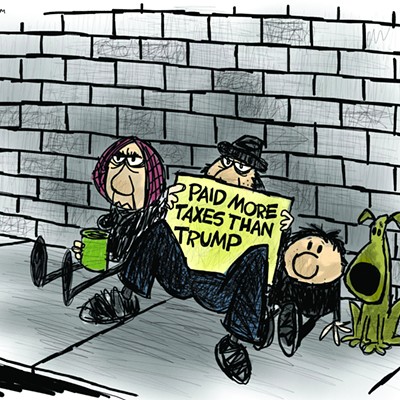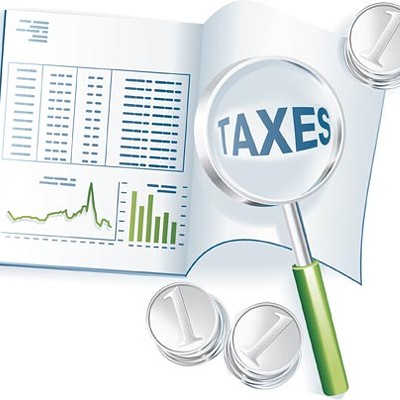Although The Tax Foundation gang says the calculation of the day "provides Americans with an easy way to gauge the overall tax take," it doesn't really mean much in terms of understanding the average person's tax burden.
That's because the federal government's progressive income tax skews the scale by forcing the wealthiest taxpayers to pay far more than the majority of Middle America. So Tax Freedom Day®--which fell on April 17 last year--might be an accurate figure, but it's not particularly useful when discussing tax policy.
As the income-tax-filing deadline looms in less than two weeks, Arizonans might be cheered by the news that the state has a similar progressive income tax--so progressive, in fact, that the majority of the tax burden is on people who reported adjusted earnings of more than six figures. A family of four that takes only the standard deductions can earn roughly $23,600 before they owe any state income taxes at all.
Filers who had a federally adjusted gross income of $40,000 or less--which accounts for nearly 60 percent of households that filed Arizona tax returns in 2004--paid less than 11 percent of the total income tax collected, according to the Arizona Department of Revenue. Meanwhile, those who reported more than $100,000 in adjusted gross earnings--fewer than 10 percent of all filing households--paid more than 60 percent of the total taxes collected. Close to 39 percent of all income taxes in the state get paid by a tiny sliver--2.24 percent--of households with an adjusted federal income of $200,000 or more.
Arizona's progressive income tax hasn't stopped Republicans from supporting across-the-board income-tax cuts in the name of tax relief. Sen. Dean Martin of Phoenix has proposed a 5 percent cut in everyone's tax bill, meaning the wealthiest Arizonans would reap a windfall while poor and middle-income taxpayers would get next to nothing--or, in some cases, simply nothing.
Martin says the argument about big breaks for the wealthy amounts to "class warfare."
"For someone who's making $25,000 a year, saving $100 off your taxes feels the same as someone who is making $250,000 getting a $1,000 cut," Martin says.
"It's proportionately the same. It feels the same from the amount of money you pay in taxes."
He compares it to using a coupon at Best Buy. "It's 10 percent off whether you buy something for $19 or 10 percent if you buy a plasma TV for $1,900," Martin says.
Martin remains confident that some sort of income-tax cut will be mixed in with the $250 million in tax cuts that GOP leaders hope to include in their budget package, which is still being hammered out.
State Rep. Phil Lopes, a Tucson Democrat, says an income-tax cut is bad policy.
"We're going to fight the hell out of that one," says Lopes, who says there's no reason to give the wealthiest Arizonans a huge tax break.
"It's an equity issue," says Lopes. "If I were going to have a serious conversation about tax cuts, they would be graduated tax cuts. But I don't even want to have that conversation."
Lopes says talk of cutting income taxes "ignores the fact that we've got roads to build and repair; we've got teachers we need to pay better; we've got schools we need to repair and build; we've got an AHCCCS (Arizona Health Care Cost Containment System) program that needs to be funded--all those things need to be done, and we need the revenue to do them."
Lopes adds that there's a more fundamental problem: Once income taxes are cut, the Legislature can't reverse course, because increasing taxes requires a two-thirds vote of the Legislature.
"Once we vote tax cuts, as opposed to rebates, we can never recoup that," Lopes says. "We're just not ever going to be able to get there."
Martin says rebates are a gimmick to help politicians get re-elected, while tax cuts are smart public policy.
"We're talking about a permanent tax cut," Martin says. "We don't do temporary tax cuts around here."















